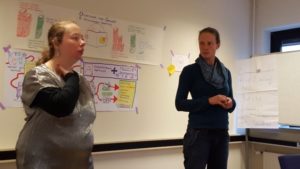We translated this blog post that self-advocate Ellis Jongerius wrote for the Dutch Care Institute (Zorginstituut Nederland). Ellis has collaborated with Inclusion Europe in the past, especially on the “Life after violence” project.
You can read the original post (in Dutch) here.

I am Ellis Jongerius, I am 34 years old and I have a mild intellectual disability. It took me years to be able to say that so clearly, and in this blog post I will tell you how I succeeded. With this post I hope to make it clear to other people with intellectual disability and also healthcare providers that everything starts with acceptance and an honest, open conversation.
I work as a trainer at LFB in Utrecht. That is the national interest organisation by and for people with intellectual disability. (Note: LFB is a member of Inclusion Europe.)
I train other people with a mild intellectual disability to become experts and speak up on their behalf. In addition, I provide trainings to healthcare professionals at colleges and universities, in order to explain to them which services people with intellectual disabilities need.
I am also a co-researcher. Through the LFB I came in touch with the Netherlands Care Institute. I am now working with them on the “Sensitive Care” project. In this project, the institute investigates – together with parties working on care for people with disabilities – which improvements in care are possible for people with a mild intellectual disability. Intellectual disability does not have to be an obstacle when building an impressive CV. Where there’s a will, there’s a way!
Acceptance is the key
Accepting yourself and being accepted by your community: that’s what it’s all about for people with intellectual disability. Nobody can do everything alone and this is also the case for people with intellectual disability. They need support, understanding and, above all, trust to get ahead. For people with a mild intellectual disability it can be challenging to bump into things that are too difficult or that they don’t have experience in. It would be great if they can work together with other people in these situations.
From my early childhood on it was clear to me that I was “different” from other children. I’d rather be together with the teacher. That was not because I did not like to play together with my classmates, but because I could not deal with the unpredictable nature of children.

Fortunately, my parents understood my situation very well and had me tested. It showed I had autism and a developmental disorder. I have difficulties with learning and planning things or going through unexpected events, and I find it hard to take initiative myself.
My parents have always been very open about this, towards both me and my community. My mother said, “You have to be clear and straightforward with Ellis, and you just have to deal with her.”
The practical approach and openness of my parents created the basis for my social success. They taught me to accept my limitations and to deal with them.
After special primary and secondary education, I completed the administrative direction at the ROC (regional training centre, a vocational secondary education centre in the Netherlands) and ended up at the LFB via a so-called social workplace. I now live completely independently and I find great fulfilment in the training work that I do.
It felt like a big compliment to me when my mother told me that I am no longer their child to take care of, but just their daughter!
In order to improve acceptance of people with intellectual disabilities, you do not only need awareness. You also need courage and honesty. You need each other’s hands and support. I wish that everyone with intellectual disability and their community will come to that conclusion. That is why I do my job at the LFB, hoping that my positive experience will be picked up and spread.
Recognition and acceptance by healthcare professionals
Healthcare professionals often do not know how to recognise intellectual disability. And if they recognise it, they often do not know how to deal with the person. One of the objectives of the “Sensitive Care” project of the Dutch Care Institute is to improve this situation. From my point of view, this applies on both parties. On the one hand, professionals need to learn to better identify and acknowledge person with intellectual disability. On the other hand, people with intellectual disability must learn to dare to speak up on their own behalf.
For example, I think that a general practitioner has the right to know that I have an intellectual disability. This promotes my health and my relationship with the doctor.

An important lesson that healthcare professionals can learn in this regard is that communication with someone with intellectual disability should be on an equal level. And in an understandable language!
To stay with the example of the doctor: if the doctor thinks I should eat healthier, the doctor should not use complicated words, but give clear explanations and recommendations. For example, it is healthy to eat fish once or twice a week. And then the doctor should tell me which fish is best for me and why it is healthy. That is clearer than the assignment to follow the food pyramid.
It also works better for me if the doctors start a conversation about food with genuine interest, not only asking what I like and dislike, but also telling what the doctors themselves personally like and dislike. That is what I mean by equality.
And I have another tip: people with intellectual disability often go to appointments with another person. That is okay, but a common mistake is that the support person will then talk to the doctor (or any other kind of professional). This is something to avoid!
The doctor must turn to me and tell me what to do. Otherwise I am no longer involved in my own process, and this is certainly not how it should be.
Positive incentives
Most people with intellectual disability see many care professionals in their lives: remedial educationalists, therapists, doctors, general practitioners, counsellors, speech therapists, employees at CIZ (Dutch healthcare centre) and many others.
All these people have a thousand different ways of communicating. So many different stimulations and inputs can be confusing or disturbing. Especially if the person has never learned to ask for help or to show vulnerability.
Limit the number of stimulations and make them positive. Look together for possibilities, but also acknowledge the impossibilities. Appreciate what people with intellectual disability can bring to the table and give positive feedback, because mistakes are allowed.
As for the person with intellectual disability: Be open about your disability and do not shut down!
I wish every person, not only persons with an intellectual disability, would work together with people who appreciate them and help them get the best out of themselves. Because even though the road is long and accompanied by smiles and tears, my tears are now tears of happiness!
Ellis Jongerius works part-time at the Dutch Care Institute (Zorginstituut Nederland) for the “Sensitive Care” project “People with a mild intellectual disability and a health problem”. In addition, Ellis works as a trainer and expert at the LFB. Ellis wrote this blog together with Jacqueline de Rijk, editor at the Healthcare Institute.





